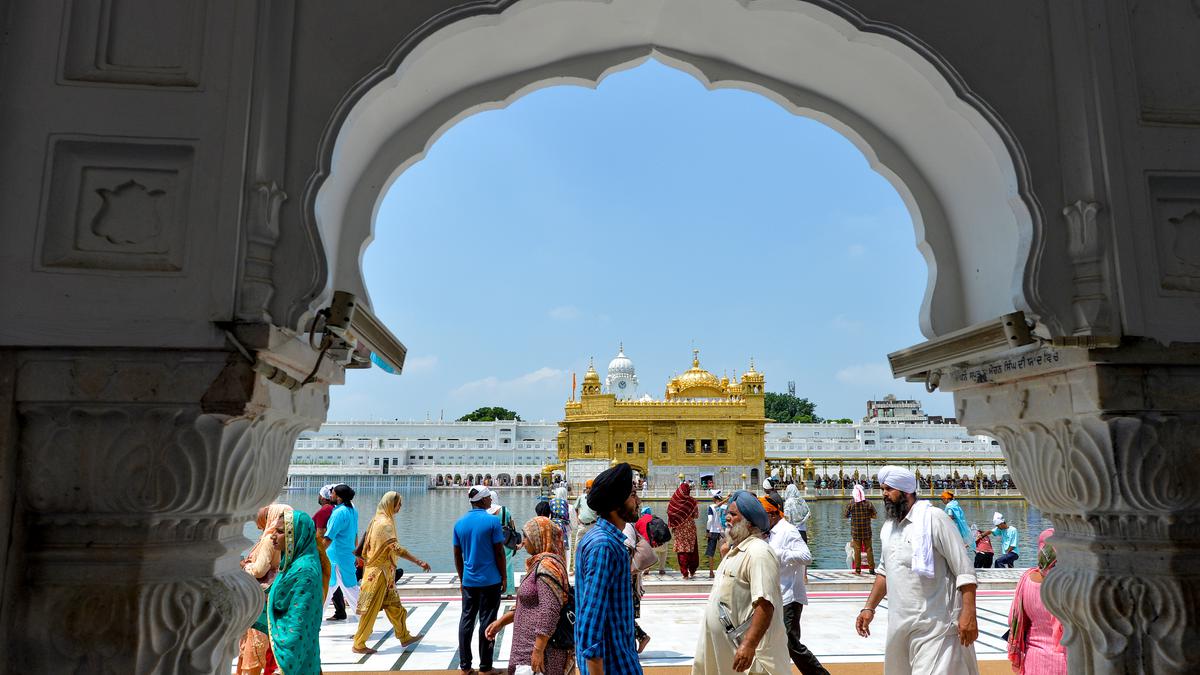
In Punjab, sacred hymns and political games Premium
The Hindu
The Aam Aadmi Party government in Punjab has passed a Bill aimed at ensuring that the broadcast and telecast of the Gurbani from the Golden Temple is free for all channels. A report on how the decision has led to a political slugfest and divided the Sikh community
As devotees walk through Heritage Street of Amritsar, the sound of melodious Gurbani kirtans (sacred hymns) fill the air. This is one of the oldest streets of the city and is lined with shops. Thousands throng the no-traffic zone, which leads to the Golden Temple. Gurbani kirtans are sung when the portals of the temple are open in the wee hours of morning. The singing stops when the portals close during the evening. The hymns are sung by Sikh clerics sitting in the gilded complex of the temple. Today, the Gurbani is at the centre of a political controversy in Punjab.
On June 20, 2023, the Punjab government passed the Sikh Gurdwaras (Amendment) Bill. Through the Bill, the Aam Aadmi Party (AAP)-led government is seeking to amend the Sikh Gurdwaras Act, 1925, which was enacted for the administration of certain Sikh gurdwaras in Punjab, Haryana, Himachal Pradesh, and Chandigarh. The government’s aim is to ensure that the broadcast and telecast of the Gurbani from the Golden Temple is free for all channels. The rights up until this point lay with G-Next Media Private Limited, which runs PTC Punjabi, a channel in which Shiromani Akali Dal leader Sukhbir Singh Badal has a majority stake. Chief Minister Bhagwant Mann said that the Bill aimed to ensure that there was no undue control of a “particular family” over the rights to telecast the Gurbani.
On June 26, the Shiromani Gurdwara Parbandhak Committee (SGPC), the apex governing body of all the Sikh gurdwaras in India and abroad, rejected the Bill. An angry SGPC said it would not tolerate “the Punjab government’s interference in the Sikh Gurdwaras Act”. Terming the move unconstitutional and politically motivated, it asked the government to withdraw the Bill or be ready to face an “intensified struggle”.
The president of the SGPC, Harjinder Singh Dhami, also pointed out that an amendment to the Act was possible only with the recommendations of the governing body. “Before making any amendment to the Sikh Gurdwaras Act, the approval of two-thirds of the members of the SGPC’s general house cannot be ignored,” he said. Political parties including the Shiromani Akali Dal also criticised the government.
While some people are angry about the move, others support it. For the AAP, which has formed the government for the first time in the State that borders Pakistan, this controversy poses yet another challenge.
Several people said the decision was an unnecessary mixing of political and religious issues. Gurpreet Kaur, 23, a law student at the Guru Nanak Dev University in Amritsar, termed the blend of politics and religion in Punjab “catastrophic”. Sitting outside the Gurdwara Sahib inside the campus of the university, she said, “The Sikh Gurdwaras Act manages the affairs of gurdwaras. It mandates the SGPC to take appropriate decisions. The AAP government should not have introduced the Bill in the Assembly. It could have separately probed the allegations of business interests surrounding the telecast of the Gurbani.”
Her friends concurred. They said decisions on amendments to religious laws should be made by people who have been associated with religious bodies for years, and not politicians.











